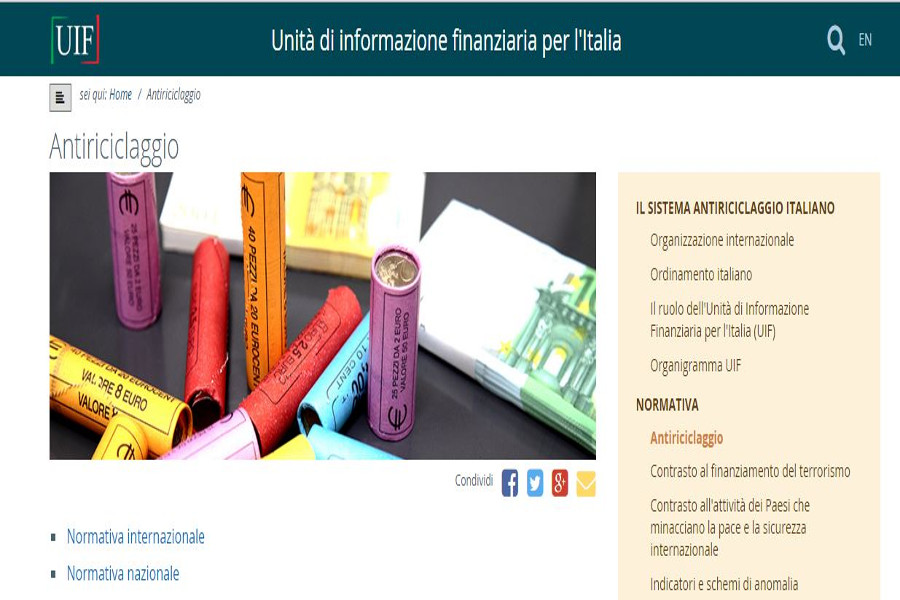What estate agents need to know about anti-money laundering regulations: client signatures are essential when undertaking risk assessments and due diligence.
The Italian Legislative Decree n.231/2007 which implemented the EU directive n. 2005/60/EC has been in force for seven years now without substantial change. This legislation outlines the various anti money laundering requirements that estate agents must have. This substantiated the existing legal framework contained in Law 39/1989, as amended and identified by art.14, subsection 1, paragraph f.
These legal provisions have, over time, been integrated with other points of clarification that have been provided by the Ministry of Economy and Finance (MEF).
Estate agents, in the usual course of their business, are required to observe, under the requirements of the anti money laundering legislation, as identified by article 17. To ensure client due diligence a statement is made and signed by the client as laid down by article 21.
With regards to the registration requirements as outlined in article 36 estate agents can do either of the following:
• establish a client file containing only essential I.D data for the client as well as a file containing all details and documentation relating to the transactions;
• establish, or maintain for those who already have one, a computer archive.
In addition, the estate agent must:
• store in the “Client File”, documentation relating to the due diligence of the client. This will include copies of identity documents, power of attorney, if required, certified copies of company registration documents, private deeds of negotiation as well as the method of payment as well as public documents;
• report any suspicious transactions if any problems are suspected;
The clients due diligence procedures include the following:
• identification checks to ensure the client are who they say they are through an up to date and valid document;
• identification of any “beneficial owner” of the transaction and/or ongoing relationships as outlined in article 21. The client must complete this for themselves as well as for any beneficial owner which forms the basis of a declaration by which the client must also specify the purpose and nature of any business (occasional transactions/relationship or performance) that is required;
ESTATE AGENT’S ADDITIONAL REQUIREMENTS
• establish a client ‘risk assessment’ and related business activities. This should conclude with a subjective evaluation and a risk rating assigned to the client as per the requirements of Decree No. 231/2007;
• maintain records for 10 years;
• have direct knowledge of the client in the course of all dealings and maintain effective controls to evaluate the potential risk of money laundering. If the estate agent cannot, or is unable to carry out this examination, they must refrain from establishing/continuing a business relationship or occasional transactions with the client. They must also assess whether to alert possible suspicious transaction to the relevant authorities;
• They are obliged, in their professional capacity, to illustrate and be aware of the money laundering legislation in general. In particular they must highlight this information to clients in a clear and understandable way. This includes, for example, the non transferability of cheques for various payments equal to or greater in value of €1,000.00, or the use of cash where the cash value is equal to or greater than €1,000.00.
All these obligations and requirements relate to estate agents who undertake estate agency brokering, business relating to the exchange and purchase of real estate, brokering business in the sale/rent of agricultural businesses and urban leases/rents for a value equal to or greater than €15,000.00.
Since the MEF has not yet given a clear and concise indication as to the correct interpretation of the rules for calculating the value of minimum lease contracts, the suggestion is that estate agents should, for the time being, take account of the value of the annual fee and the amount of any security deposit.
The anti-money laundering obligations should be activated at the conclusion of the contract (accepted proposal/preliminary contract or, in the absence of the same, the final notary deed of sale) and not at the initial stage when the work is entrusted to the estate agent (except, of course, when this will generate an ongoing relationship) or at the draft proposal stage: in the latter two cases it will be sufficient to provide for and prepare a client due diligence application form and risk assessment to be countersigned.
In summary therefore, when a client instructs to sell or lease a property, or when signing a direct offer/lease (always for amounts equal to or greater than €15,000.00), the estate agent should ensure that there is the following good practice:
• they should be issued with all consents in relation to the processing of data, subject to information, in accordance with Legislative Decree no. 196/2003 (Privacy);
• make a copy of a client’s valid document and ensure that they sign all due diligence documents and that these are duly completed;
• insert the documents referred to in the preceding paragraphs into the ongoing practice file;
• draw up a client ‘risk assessment’;
• within 30 days of the conclusion of business, record client data in the computer archive or in the client file indicating the numbers and references referred to in the preceding paragraph and the registration date.
Edited by Angela Cocca and translated by Tanya Pia Starrett










